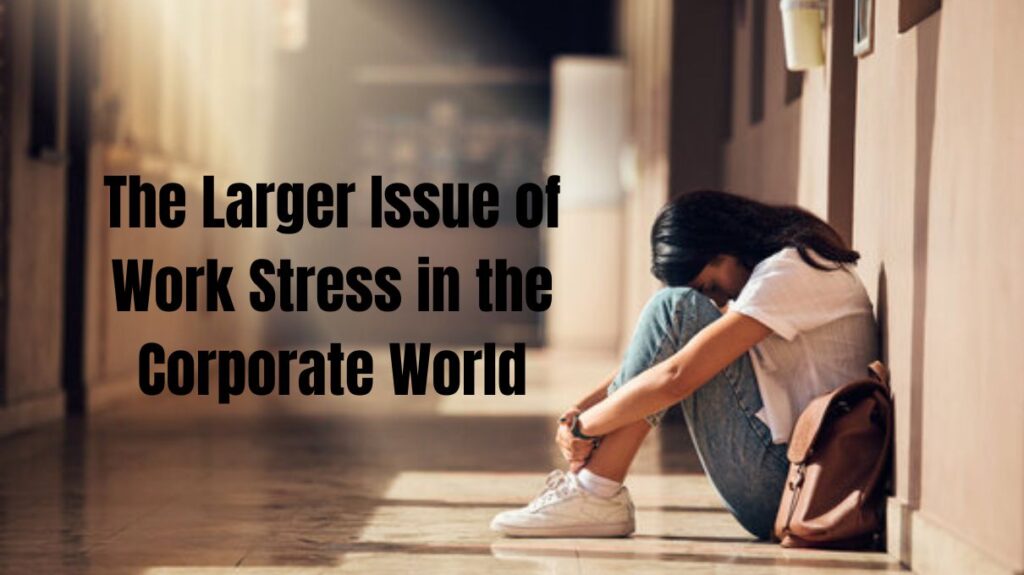In an alarming instance of corporate overwork, a young woman tragically lost her life. The 26-year-old Chartered Accountant, Anna Sebastian Perayil, had joined EY Pune, one of the Big Four accounting firms, just four months before her death. Her family claims that work-related stress was a significant factor that led to her untimely passing.
In a heartfelt and powerful letter, her mother, Anita Augustine, addressed her concerns to the company’s India boss, Rajiv Memani, shedding light on the intense pressures that burdened her daughter. Augustine’s letter underscores the sharp contrast between the company’s publicly stated human rights values and the grim reality Anna experienced while working there.
EY Pune Tragic Loss Due to Corporate Overwork A 26-Yer Old C.A (toptrendshub.com)
Enthusiasm Met with Overwhelming Pressure
Anna had recently passed her Chartered Accountant (CA) exams in 2023 and embarked on her career at EY Pune in March 2024. As a fresh graduate stepping into her first job, Anna showed immense dedication and commitment to meet the high expectations placed on her. Like many young professionals, she believed that hard work, dedication, and perseverance would lead her to success. However, the workload began to take its toll almost immediately.
Her mother recalls how Anna started suffering from stress, sleeplessness, and severe anxiety shortly after joining the company. But despite the warning signs, she continued to push herself, thinking that this struggle was just part of the learning curve in a demanding industry. The pressures were relentless, leading Anna to devote all her energy to work, leaving little room for personal care or balance.
Resignations and Mounting Responsibilities
Anita Augustine expressed how Anna’s situation was worsened by the fact that several employees had already left the company due to the same overwhelming workload. With each resignation, Anna was told by her superior to “stick around and change everyone’s opinion about the team.” This added yet another layer of expectation to Anna’s already overburdened shoulders, as she felt responsible for holding the team together despite the challenges she faced.
At times, her manager would make things even harder by rescheduling meetings during cricket matches, a time when most employees were relaxing, and assigning additional tasks at the end of the day. These tactics increased the strain on Anna’s mental and emotional well-being, making it harder for her to cope.

The Impact of an Unsupportive Work Environment
One of the most distressing aspects of Anna’s experience was the hostile work environment she found herself in. According to her mother, even during social occasions like office parties, senior leaders would make casual remarks that further intensified her anxiety. At one party, a senior leader joked about how difficult it would be for Anna to work under her manager. What was said in jest, however, soon became her everyday reality.
The unsupportive and toxic work environment took a heavy toll on Anna, making it increasingly difficult for her to thrive or find any reprieve from the growing demands. Despite confiding in her family about the enormous workload, she felt trapped and unable to change her circumstances, given the pressure and expectations placed on her.
Working Late Nights and Weekends: No Respite for Anna
Anna’s work-life balance deteriorated quickly, as she found herself working late into the night and on weekends. This wasn’t just about completing official tasks; her managers often assigned her extra work verbally, beyond the written assignments. Her mother vividly recalls how Anna would confide in her about these additional tasks that left her with no opportunity to rest or recharge.
Despite her family’s encouragement to push back against such unfair demands, Anna’s managers remained relentless. They continued assigning tasks, ignoring the impact on her health and well-being. The mental and emotional exhaustion became overwhelming, but Anna felt obligated to meet the expectations placed upon her.
The Final Straw: An Unreasonable Deadline
One particular incident that stands out in Anna’s mother’s memory occurred when her assistant manager called her at night with a new task that was expected to be completed by the following morning. This left Anna with barely any time to rest or recover. When she raised her concerns about the unreasonable deadline, the response she received was dismissive and cold: “You can work at night; that’s what we all do.”
This response encapsulated the toxic work culture that Anna had become trapped in. It wasn’t just a matter of occasional overtime or pushing through a tough project; it was a constant, unrelenting demand to prioritize work above all else, even at the expense of personal health and well-being. The company culture seemed to glorify overwork, making it impossible for Anna to escape the expectations.
A Mother’s Heartbreaking Plea
In her letter to EY India’s boss, Rajiv Memani, Anita Augustine laid bare the reality of her daughter’s life in the months leading up to her death. She condemned the company for perpetuating a culture that glorifies overwork and neglects the well-being of its employees. The values of human rights and employee care that the company touted publicly were, in her view, mere lip service that failed to protect her daughter from the demands of a toxic workplace.
Augustine’s letter is not just a plea for justice for her daughter; it is a call to action for all corporations to take a hard look at the work culture they foster. Overwork should never be celebrated or seen as a badge of honor. Instead, companies must prioritize the well-being of their employees, recognizing that a healthy work-life balance is essential for both individual success and corporate productivity.
The Larger Issue of Work Stress in the Corporate World
Anna’s tragic death has brought attention to a much larger issue that plagues many modern workplaces. The culture of overwork is not limited to one company or industry. Across the corporate world, employees are being pushed to their limits, with long hours, unrealistic expectations, and a constant pressure to prove their worth. This culture is particularly prevalent in industries like finance, accounting, and technology, where the stakes are high, and competition is fierce.
Young professionals, like Anna, are often the most vulnerable to this culture. Fresh out of university, eager to prove themselves, and driven by the belief that hard work will lead to success, they push themselves beyond their limits. But the cost of this relentless drive can be devastating, leading to burnout, mental health issues, and, in the most tragic cases, loss of life.
The Role of Corporate Leaders in Shaping Work Culture
Corporate leaders play a crucial role in shaping the culture of their organizations. They set the tone for what is valued, what is celebrated, and what is expected of employees. If leaders glorify overwork, employees will feel compelled to push themselves beyond their limits, fearing that failure to do so will result in negative consequences for their careers.
Conversely, leaders who prioritize work-life balance, mental health, and employee well-being create a culture where employees feel supported and valued. In such environments, employees are more likely to thrive, both personally and professionally, leading to better outcomes for the company as a whole.
A Call for Change
Anna Sebastian Perayil’s story is a heartbreaking reminder of the human cost of a toxic work culture. Her death should serve as a wake-up call for corporations to reevaluate their practices and prioritize the well-being of their employees. No job, no matter how prestigious or well-paying, is worth sacrificing one’s health and life for.
As we reflect on Anna’s story, we must ask ourselves: What kind of work culture are we creating? Are we building environments where employees can thrive, or are we perpetuating a culture of overwork and burnout? The answers to these questions will determine the future of our workplaces and the well-being of those who work within them.
Anita Augustine’s plea for justice for her daughter should not be ignored. It is a call for change, not just at EY Pune but across all industries that glorify overwork and neglect the mental and emotional health of their employees. Companies must take responsibility for the culture they create and the impact it has on the lives of their employees.

In the end, it is not just about profits and productivity. It is about creating workplaces that value and respect the people who work there, recognizing that their well-being is the foundation of long-term success.
Anna Sebastian Perayil’s Struggle: A Tragic Story of Corporate Overwork
Anna Sebastian Perayil, a bright and ambitious 26-year-old Chartered Accountant (CA) from Kerala, faced a tragic end just four months after joining EY Pune. The grueling work culture she endured during this time highlights a deep problem in the corporate world. Despite her efforts to succeed, Anna’s mental and physical health rapidly deteriorated under immense work pressure. Her story, shared by her grieving mother, Anita Augustine, paints a vivid and heartbreaking picture of what happens when companies push employees beyond their limits.
The Physical and Mental Toll of Excessive Work
Anna’s daily routine at EY Pune crushed her spirit and health. Describing her daughter’s struggle, Anita recalled, “Anna would return to her room utterly exhausted, sometimes collapsing on the bed without even changing her clothes. Almost immediately, she’d receive messages demanding more reports.” The unrelenting work cycle weighed heavily on Anna, yet she kept pushing herself, determined to prove her worth and meet unrealistic deadlines.
Despite her exhaustion, Anna refused to give up. She was a fighter, a person who didn’t back down easily. Although her family advised her to quit, Anna remained committed to gaining new experiences and furthering her career. However, even her incredible resilience couldn’t withstand the overwhelming pressure she faced daily.
A Culture of Overwork and Unreasonable Demands
In a heartfelt email to the company’s India head, Rajiv Memani, Anita directly criticized EY Pune culture of “glorifying overwork.” Anna, who was new to both the organization and the city, struggled to cope with the endless stream of tasks. Not only did she have to manage her assigned responsibilities, but she also found herself burdened with extra work that her managers informally demanded.
Young professionals like Anna often lack the experience and confidence to push back. Instead of setting healthy boundaries, Anna tried to excel in a challenging, high-pressure environment. Unfortunately, her dedication to proving herself in this new world drove her past her breaking point. As Anita heartbreakingly stated, “Now, she is no longer with us.”
Contradictions Between EY’s Values and Reality
One of Anita’s most poignant points involved the glaring contradiction between EY Pune public stance on human rights and the reality her daughter endured. “How can EY live by the values it claims to uphold?” Anita questioned, highlighting the enormous gap between the firm’s stated commitments to employee well-being and the grueling work culture Anna faced. For Anna, words like fairness, respect, and employee wellness seemed meaningless in light of the harsh environment she encountered.
This criticism extended far beyond a personal grievance. It’s a call for EY Pune, and other firms like it, to rethink how they treat their employees. Anita stressed the need for her daughter’s death to prompt reflection on how companies can create healthier work environments. Corporate cultures that celebrate overwork at the expense of mental and physical health can no longer continue unchecked.
An Absence Felt Deeply: EY Pune Silence After Anna’s Death
In addition to dealing with her daughter’s death, Anita felt abandoned by Anna’s colleagues at EY Pune. Shockingly, none of them attended Anna’s funeral. This absence struck a deep blow to the grieving family. For an employee who had dedicated so much to the company, the lack of presence from her team was a stark reminder of how disconnected the firm truly was from its own values.
Anita reached out to Anna’s managers after the funeral, hoping for some acknowledgment of her daughter’s contributions. Yet, their silence only amplified the family’s pain. Instead of offering support or expressing condolences, EY Pune failed to show even the smallest gesture of empathy or respect.
A Family’s Desperate Efforts to Save Anna
Although the exact cause of Anna’s death remains unclear, her family witnessed signs of her declining health in the weeks before she passed. Anna had complained of chest constriction, prompting her family to take her to the hospital. Doctors conducted an ECG, which came back normal, and a cardiologist reassured the family that Anna’s symptoms likely stemmed from exhaustion and poor sleep. However, the treatment provided only temporary comfort. Just a few weeks later, on July 20, 2024, Anna’s life came to a sudden and tragic end.

The anguish of losing Anna has only been deepened by the unanswered questions surrounding her final days. As her mother and family continue to seek justice, they find themselves grappling with an overwhelming sense of loss and a desire to ensure that other families never face the same fate.
Corporate Culture and the Sacrifices of Overwork
Anna’s story serves as a stark reminder of the dangers posed by corporate environments that glorify overwork. Young professionals, especially those new to their careers, often feel enormous pressure to meet unrealistic expectations. They lack the experience needed to navigate these challenges and end up sacrificing their health in the process.
In industries like finance, consulting, and accounting, the competition is fierce, and the pressure to deliver results can become unbearable. Companies that place such high demands on employees risk not only burnout but also potentially catastrophic consequences for their workforce.
Anna’s experience reveals the hidden cost of these corporate cultures. While employees might meet short-term goals or demonstrate their commitment, the long-term effects are devastating. Mental health issues, burnout, and physical exhaustion all contribute to an unsustainable work-life balance that no amount of professional success can justify.
The Role of Leaders in Building Healthier Work Environments
Corporate leaders play a crucial role in shaping the culture of their organizations. When top management glorifies long hours and relentless work, employees feel pressured to conform, often at great personal cost. On the other hand, leaders who prioritize balance and mental health set the tone for a healthier and more sustainable work environment.
The responsibility of leadership extends far beyond just maximizing productivity. Ensuring that employees have the support they need to thrive — both professionally and personally — should always be a priority. Companies that prioritize employee well-being often see greater levels of engagement, loyalty, and overall success in the long run.
Prioritizing Employee Well-Being
Anna’s death serves as a wake-up call for companies everywhere. It’s time to rethink corporate culture and take decisive steps to protect employees’ health and well-being. Work should never come at the expense of an individual’s mental or physical health, and companies need to foster environments where employees feel empowered to set boundaries and push back against unreasonable demands.
Anita Augustine’s plea for justice goes beyond simply holding EY Pune accountable. She calls on all companies to evaluate their practices and make employee well-being a top priority. This includes providing resources for mental health, encouraging a balanced work-life dynamic, and ensuring that employees feel safe speaking up when the pressure becomes too much.
A Widespread Issue in Corporate Environments
The culture of overwork isn’t unique to Anna’s case at EY Pune. It’s a pervasive issue in today’s corporate world, affecting industries like finance, technology, and consulting, where employees often face grueling hours and unrealistic expectations. These high-pressure environments create fertile ground for burnout, anxiety, depression, and a range of physical health problems.
The consequences of overwork ripple throughout the corporate world. While some individuals manage to endure the demands for a time, many ultimately succumb to the mental and physical tolls. Companies that perpetuate this work culture may achieve short-term gains, but they do so at a tremendous cost to their employees.
Time for Corporate Responsibility
Anna Sebastian Perayil’s death should not be in vain. Her story highlights the urgent need for companies to take responsibility for the well-being of their employees and to foster a culture that values balance, health, and respect. Corporate success cannot come at the expense of employee lives, and no job should ever demand the kind of sacrifice that Anna made.
Employers must take this moment to reflect on their workplace cultures and to make meaningful changes that prioritize employee health and well-being. EY Pune creating supportive environments, companies not only protect their employees but also ensure long-term success and sustainability.
As we honor Anna’s memory, let her story inspire companies to take action and prevent such tragedies from ever happening again. Only then can we truly claim progress in creating healthier and more humane workplaces.



